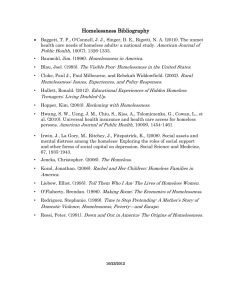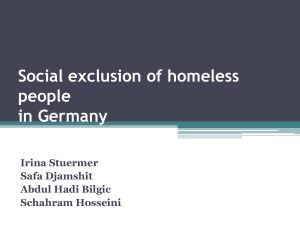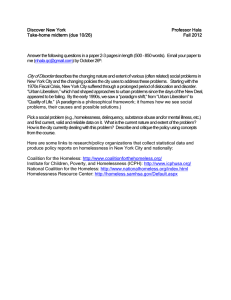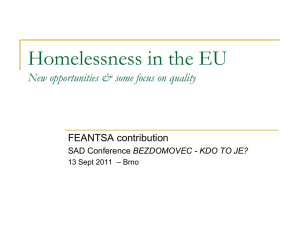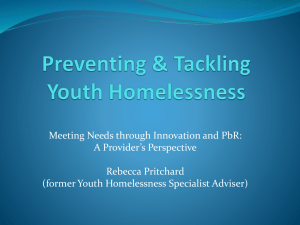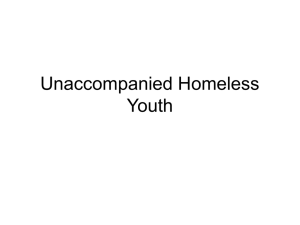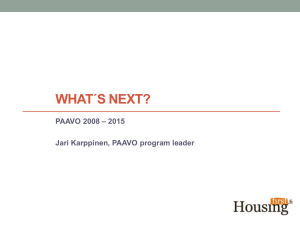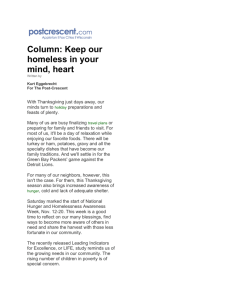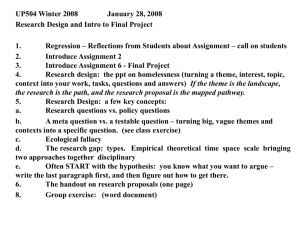Sakey - Council to Homeless Persons
advertisement
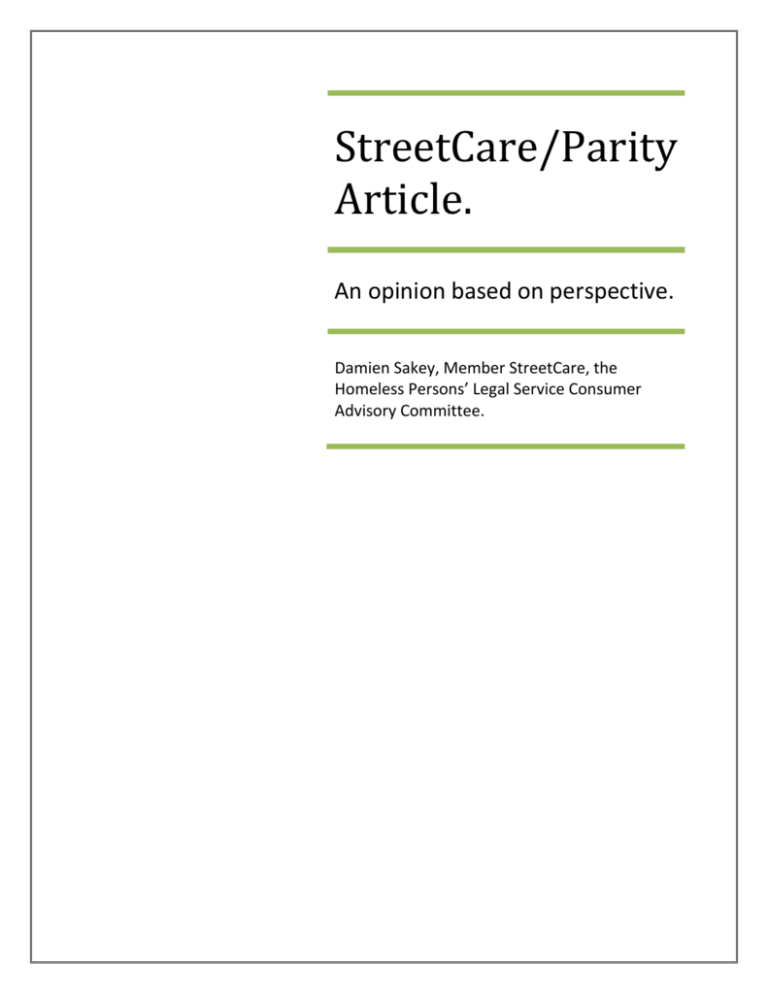
StreetCare/Parity Article. An opinion based on perspective. Damien Sakey, Member StreetCare, the Homeless Persons’ Legal Service Consumer Advisory Committee. “Everybody's hell is different. For some people its punishment for sins. For others, it’s a deep pool of self-doubt and loneliness.” (Unknown) First impressions last, an adage poetic in its simplicity. The impressions of which I am more familiar are definitive and enduring if nothing else. Losers, waste of space, failure, scum, pathetic and financial drain are but a few of the favoured impressions given bold presentation through various forms of media. As emotive opinions for those of my ilk such impassioned perspective gives me pause to consider how an entire community can earn this intense and often (to my perspective) an almost compulsive ire. Nevertheless, these are long held impressions that have followed the homeless community since the dawn of society. I find it ironic that homelessness predates social intolerance on an historic, if not biblical, plane but I cannot set aside a potential concept that homeless individuals are frequently being viewed to spring full grown with varying degrees of physical and psychological complications while little thought is given to any mitigating circumstances resulting in their current standard of living. While self-inflicted homelessness due to substance abuse is a debate well publicized as a circumstance of events my belief is that morally, it is an injustice to voice an opinion based solely on this aspect. This injustice I perceive would not only be towards the homeless community as a whole, but also to the individual or group who maintained this circumstance as the total sum of why and how people become homeless. Domestic crises, loss of financial stability, personal loss, physical/mental complexities encompassing the result of neglect and abuse must also be considered in its entirety to equal extent when contemplating an informed opinion toward the causes of homelessness. For instance, my life on the streets began at the age of seven. The choice to sleep rough was simply due to the abusive nature of my home environment. Even at such an age I believed wholeheartedly that life on the street would not only be safer but that it would also be an environment that afforded me the freedom to defend myself and fight back. In the very least, this 2 was an action I could assume mentally if not always physically. Under the parameters of “The Definition of Homelessness” (Mackenzie & Chamberlain, 1992) this would not be my first experience of homelessness and now thirty three years later, I have not yet had my last. During those first few months I was exposed to a world never before imagined, court magistrates, social workers, foster caregivers, mediators, counsellors, therapists and psychologists to name a few. A world not only intimidating but increasingly magnified by an overwhelming loss of translation in comprehending individual titles coupled with assertive personalities dominant in their measured and informed opinions. The effect this situation would produce seemed to be apparent only to myself; a relatively quiet young boy became silent. Seemingly this was an acceptable outcome, in their opinion at least. The assumption that having such a combination of authority at hand would resolve any, if not all, conflict in short measure was in fact an unfortunate misconception. My experiences at this level are frustratingly repetitive and most disheartening in that I have borne witness to countless examples of where the underlying problem becomes secondary to an overlapping chorus of “in my opinion”. Granted that an adherence to due process must always be maintained and is relevant to the academic training of a career professional. It is of little consequence however to the individual in crisis if a departmental “conflict of interest” exists, either in a clerical manner or professional. It is again of minimal interest to any crisis scenario if these become the primary factors in perpetuating continued difficulties and strife, wouldn't you agree? Of course, it is with deep respect and admiration to a variety of individuals and service providers alike throughout these experiences that have by some degree inspired not only myself but countless others to express an active need for acceptance across the varying dynamics to access the open knowledge of those considered to have “lived experience”. I ask how it can be deemed to be impracticable to utilize the collective knowledge of any individual or group that may illuminate soluble and potentially “enduring solutions” to the problematic circumstance of 3 homelessness. As a point of reference there has yet to be formulated any given solution that has proven viable beyond reproach and so remains frustratingly elusive. I may perhaps also ask a finer example for any individual whether previously or currently homeless to determine their potential to greater society. Specifically those corners of society that are critical of the positive input such an individual could contribute as to the overall physical aim in this question which is, the improvement to the quality of life experienced by those who are either currently or in danger of becoming homeless. I am of a solid belief that peer support through lived experience enhances not only this outcome effectively but doubly aids in the effort of stability and self-improvement in a post-placement environment. An important point through these instances has been in seeking an open acceptance of those with lived experience inclusive of a more deserving validation beyond a charitable, if not qualified, concept. Developing an equal platform in maintaining consumer relations adhering not only to the rights of an individual but also, in the most profound sense, of simply acknowledging the sacred right to be viewed as a human being is not a qualification but an act of compassion that measures one’s own humanity. This has indeed proved integral in the initiation and maintenance of modern barrier breaching outcomes across the broad spectrum of simple dialogue alone. Recently, I was extended an invitation to become a part of a small advocacy committee called StreetCare based in Sydney, NSW. This invitation was both surprising and somewhat humbling as I felt presented with an opportunity to again work among peers of diverse backgrounds yet united unequivocally through personal experience to effect positive change in the name of those existing on the fringes of society. A unique pre-requisite in that all members of the committee have experienced homelessness, they operate not only throughout their respective communities individually, but also strive jointly at a state and national level to represent the voices and needs of the homeless community and see they are given acknowledgement and fair consideration. 4 Ultimately, to be provided an opportunity to utilise the experiences of my life as a foothold through which to communicate as a representative for the homeless community is firstly surreal in the sense that I have waited so long not to be afforded the opportunity, but that I have waited for such a time that all levels of society would become receptive to who we represent on an open and neutral foundation. Secondly though, I am saddened that immediate relevance can be found in today’s terms through an accumulation of life experience extending four decades into the past. In an environment where accountability and progression through contribution to society is demanded, it is my goal to also seek a direction that leads further than prevention of a recurring cycle of homelessness as it currently exists. My goal embraces prevention of a homelessness cycle in as what it is likely to become. 5

